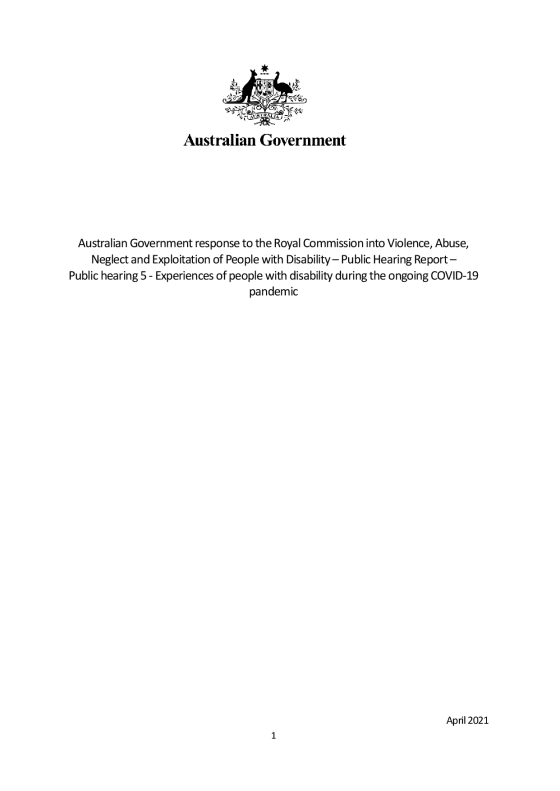This is a summary of the Australian Government response to the Disability Royal Commission Public Hearing 5 report into the experiences of people with disability during the COVID-19 pandemic.
In August 2020, the Royal Commission into Violence, Abuse, Neglect and Exploitation of People with Disability (the Royal Commission) held a public hearing on the impacts of COVID-19 on people with disability.
Specifically, the hearing considered:
- how the COVID-19 pandemic has affected people with disability
- how disability supports have changed because of COVID-19
- if people with disability have been safe during the COVID-19 pandemic
- what the Australian Government has done for people with disability during the COVID-19 pandemic.
Following the hearing, the Royal Commission released a report titled “Public hearing 5 – Experiences of people with disability during the ongoing COVID-19 pandemic”
The report considered the experiences of people with disability during the COVID-19 pandemic and contained 22 recommendations mainly focusing on the Australian
Government’s response in the early stages of the pandemic.
The Australian Government welcomes the opportunity to respond and has prepared a response.
The full response is available on the Department of Social Services website.
Broadly, the Royal Commission recommended the Australian Government:
- ensure people with disability and their representatives are involved in planning
- and responding to emergencies like the COVID-19 pandemic
- include First Nations people with disability in meetings about COVID-19
- and Aboriginal and Torres Strait Islander People
- create instructions to control COVID-19 in disability accommodation
- ensure the disability workforce can get tested for COVID-19, is trained properly and have protective equipment like masks to wear
- provide more funding to advocacy organisations if there is a significant wave of COVID-19 in Australia or another emergency
- ensure data about people with disability during emergencies is properly collected and published
- review National Disability Insurance Scheme (NDIS) Quality and Safeguards Commission documents and plans to ensure they are appropriate for emergencies
- ensure people with disability do not miss out on healthcare or vaccines for COVID-19 because of their disability.
The full list of recommendations is on the Royal Commission’s website.
The Australian Government has considered the Royal Commission’s report and their recommendations.
The Australian Government supports or supports in principle 21 of the recommendations and notes one.
The Australian Government has already taken action to address and implement many of the recommendations including:
- reform to consultation processes
- improvements to data
- improvements to governance arrangements
- the development of further guidance for providers of
- disability accommodation services.
Throughout the pandemic, the Australian Government responded to the needs of people with disability based on the best medical advice and in acknowledgement of local public health orders.
The Australian Government agrees with the Commission that:
- it is very important that people with disability are healthy and safe during emergencies like the COVID-19 pandemic;
- it will continue to include people with disability and their representatives in planning and responding to emergencies like COVID-19;
- it will provide COVID-19 vaccinations to people with disability and the disability workforce before some other people in the community;
- it is committed to complying with Article 31 of the United Nations Convention on the Rights of Persons with Disabilities; and
- People with disability should never miss out on healthcare because of their disability.
The COVID-19 pandemic resulted in feelings of increased anxiety and concern within the Australian community.
Recognising the additional pressure people with disability and their families may experience during this time, the Australian Government:
- implemented new services including the Disability Information Helpline;
- developed a specific management and operation plan and consultation forums;
- online infection prevention and control training;
- facilitated flexible supports for NDIS participants and providers;
- provided regular information for people with disability and their carers, NDIS participants, and NDIS providers;
- ensured priority access to Personal Protective Equipment (PPE) and mainstream supports such as the JobKeeper program and paid pandemic leave to eligible people and business within the disability sector; and
- ensured the COVID-19 vaccination program will commence with priority populations including aged care and disability care residents and workers, frontline healthcare workers and quarantine and border workers.
All governments have a shared responsibility for emergency management,
public health and to support people with disability.
It is critical that all governments ensure mainstream services, programs and policies continue to service the 4.4 million people with disability, including the 432,649 participants of the NDIS as at 31 December 2020.
The Australian Government will continue to work with state and territory governments to ensure the health, safety and wellbeing of people with disability throughout the course of the COVID-19 pandemic including any localised outbreaks, the recovery period, and future emergencies.
The Australian Government welcomes the opportunity to continue to engage with the Royal Commission on issues of importance to people with disability.
If you need more information about COVID-19 or want to find information about support for you:
You can call the Disability Gateway (1800 643 787).
They are open from 8am to 8pm, Monday to Friday.
You can also visit their website for more information (www.disabilitygateway.gov.au).
You can visit the Department of Health website for more information about the vaccine (www.health.gov.au).
You can call the National Coronavirus Helpline (1800 020 080).
If you need information in a language other than English, call the Translating and Interpreting Service (131 450).
If you are deaf, or have a hearing or speech impairment, you can call the National Relay Service (133 677).
The National Counselling and Referral Service offers free advocacy and counselling support.
You can contact them for more information (1800 421 468, or visit www.dss.gov.au/disability-and-carers/disability-counselling-and-advocacy-support).
The service is available 9am to 6pm weekdays, and 9am to 5pm weekends and national public holidays.
For more information about the Royal Commission, visit the website at disability.royalcommission.gov.au.
